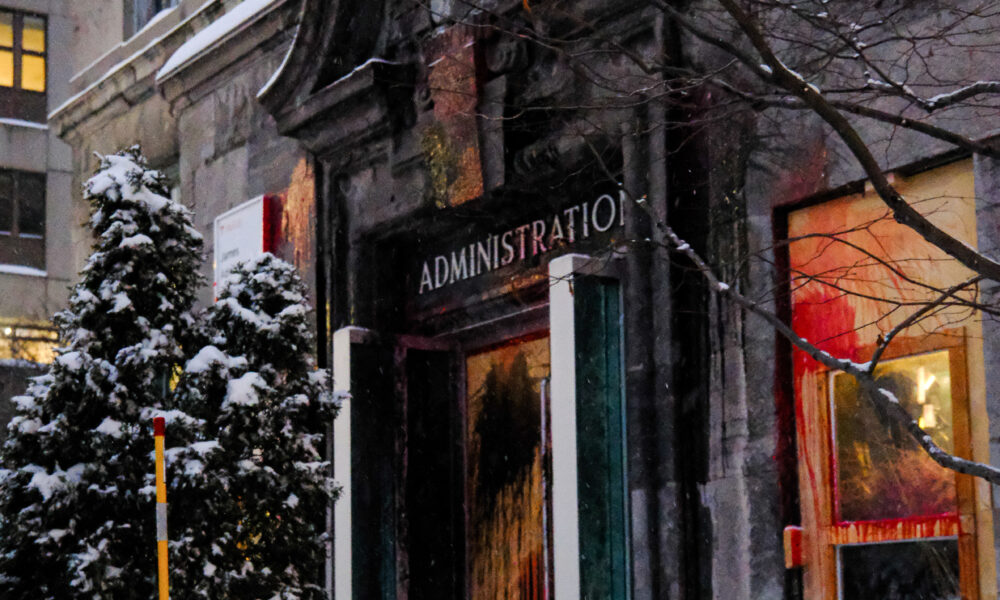The McGill Board of Governors (BoG) held its first meeting of the Winter 2025 semester on Feb. 6. The BoG—which has the final say over all academic, business, and financial affairs at the university—began after nearly two hours of private session, closed to the public and media. The meeting’s open session commenced with a report from McGill’s President and Vice-Chancellor Deep Saini.
Among Saini’s remarks was a reflection on the annual meeting of the World Economic Forum, which he attended in Davos, Switzerland in late January. According to Saini, the conference was dominated by conversations about AI. He noted that universities are globally seen as laggards in the AI sector.
“While we are generators of a lot of the technology that drives AI, we are almost absent from that option,” Saini said. “McGill has the opportunity to actually leapfrog and show the way.”
Next, the meeting moved on to committee reports, starting with the Committee on Sustainability and Social Responsibility (CSSR). On June 25, 2024, community members submitted an Expression of Concern (EoC) to the committee, urging McGill to review divestment—which was resolved in December 2024, with the BoG ultimately deciding not to divest. In its report on the matter, the committee stated that “the concept of ‘social injury’ is not one which extends a ‘daisy chain’ of causation to an infinite number of parties through their mere association or presence in a territory.”
Committee Chair Alan Desnoyers explained that during the same period, the BoG received a request from the McGill administration to explore divestment from “direct investments in companies that derive a dominant portion of their direct revenues from the production of military weapons, regardless of the country in which they operate.” The latter came from negotiations between the administration and the Palestine Solidarity Encampment which took place on Lower Field for 75 days in the spring and summer of 2024, until the university dismantled it. The report shared at the Feb. 6 meeting was in regard to the administration’s request for review.
Ultimately, Desnoyers explained that the CSSR would again, not recommend divestment.
“After careful consideration of the diverse opinions and expert insights, as well as the review of McGill’s investment practices, the committee is satisfied that the university’s overall investment approach is well-positioned to preserve the capital of the McGill investment pool within the social and ethical norms of the university,” Desnoyers said.
Following Desnoyer’s presentation, Students’ Society of McGill University (SSMU) President Dymetri Taylor expressed that this decision may face backlash from students and community members and asked the Board if it would ever consider such divestment.
“I don’t think you can ever say ‘Never.’ I think it’s very context-dependent, and at this stage, […] we felt it wasn’t necessary,” Chair of the Board, Maryse Bertrand responded.
In a written statement to The Tribune, Students for Palestine’s Honour and Resistance (SPHR) wrote that this decision will not deter their action.
“Last Thursday was a reminder to the BoG that we will not be quiet and there will be no business as usual until divestment,” SPHR wrote.
The Board then moved to hear a report from the Audit and Risk Committee. Committee Chair Maarika Paul outlined the group’s updates, including that all of the recommendations outlined in the Internal Audit Final Report of the Macdonald Campus Asbestos Investigation have been completed. This report was submitted to the Board in September 2023 in response to multiple incidents of asbestos exposure on the satellite campus that year.
The Board then heard a presentation from Dean Viviane Yargeau on the Faculty of Engineering. Yargeau emphasized her focus on expanding experiential learning, citing the faculty’s newly-introduced Internships and Co-ops Office. The Dean also touched on gender diversity in the faculty, stating that with 36 per cent of its engineering students identifying as women, McGill has one of the highest proportions in the country.
Finally, Taylor presented on SSMU, outlining the union’s management structure, funding mechanisms, what student groups SSMU supports, and current challenges the body is facing. These challenges included polarization of the student body, a lack of engagement, and the overpowering authority of SSMU’s Board of Directors over its Legislative Council.
Moment of the meeting:
As the BoG met inside the James Administration Building, protestors splattered red paint on the outside walls of the building, materializing their discontent with McGill’s response to calls for divestment.
Soundbite:
“That’s certainly more information about the SSMU than I’ve ever had in all my years here.” — Bertrand on Taylor’s SSMU presentation.








